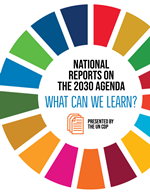Published on Wed, 2021-07-28 06:05
Forty years ago the least developed countries were promised acceptable minimum standards of living for their peoples by the end of the 20th century. But developed countries, instead of providing the promised finances, technology and capacity building made their fate worse, adding climate change and vaccine hoarding to the long list of challenges. As a new UN Summit for the LDCs is being prepared, Third World Network and Social Watch submitted a joint text with concrete proposals of what needs to be done to not leave the poor countries behind... again. |
Published on Thu, 2021-07-15 16:42
“We are in the midst of an unprecedented crisis. The severity of its impact is being felt globally. The LDCs are bearing its heaviest brunt. They have weak infrastructures, and a serious lack of capacity to cope with internal and external shocks.” -- H.E. Rabab Fatima, Permanent Representative of Bangladesh and Co-chair of the Fifth UN Conference on LDCs (LDC5) Preparatory Committee |
Published on Tue, 2021-07-13 00:00
Compiled under the challenging conditions resulting from the COVID-19 crisis, this edition of the Trade Union Take on the SDGs analyses and compiles the monitoring of the implementation of the Sustainable Development Goals (SDGs) at national level undertaken by 22 labour organisations in 13 countries and four continents. |
Published on Mon, 2021-07-12 12:27
The Covid pandemic affects all, but its impacts are socially and geographically unequal: The poor are being impoverished and inequalities between countries are rising even more as a result of the very unequal distribution of vaccines. This is the main message emerging from the alternative civil society reports that balance the frequently over-optimistic or complacent report from governments on their progress towards sustainable development. |
ONLINE | Voluntary National Reports on the 2030 Agenda: What can we learn for a post-pandemic world?
The Committee for Development Policy (CDP) will discuss with Civil Society Reflection Group their key findings of its analysis of 2020 VNRs, highlighting the disconnect between the ambition of the agenda and the attention given to the transformative policies in such areas as productive capacities, pandemic preparedness, inequalities and sustainable consumption and production. |








